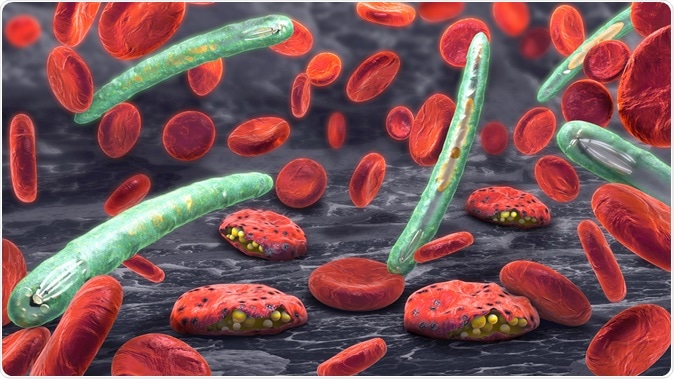Malaria is a deadly mosquito borne parasitic disease that kills thousands worldwide. Over the past few decades the war against malaria has managed to stop deaths globally. However the latest WHO malaria report 2018 says that the efforts against malaria need to be renewed to reduce the number of deaths due to this disease.

3d illustration of blood cells, plasmodium causing malaria illness. Image Credit: Christoph Burgstedt / Shutterstock
WHO has joined hands with other organizations to raise the public awareness, increase funding, and strengthen prevention and treatment of malaria. The report in 2017 also stated that around 219 million cases of malaria were detected. The year before, the number of cases were 217 million. The reduction in the number of cases was noted between 2010 (239 million) and 2015 (214 million cases). Since 2016 the numbers seem to have stagnated and the efforts need to be renewed to further reduce the numbers says the WHO.
Dr Tedros Adhanom Ghebreyesus, WHO Director-General in a statement says, “Nobody should die from malaria. But the world faces a new reality: as progress stagnates, we are at risk of squandering years of toil, investment and success in reducing the number of people suffering from the disease. We recognise we have to do something different – now. So today we are launching a country-focused and -led plan to take comprehensive action against malaria by making our work more effective where it counts most – at local level.”
The report adds that in 2017 70 percent of all malaria cases (151 million cases) as well as around 274000 deaths were seen in 11 countries of which 10 were from Africa. The countries worst affected were Burkina Faso, Cameroon, Democratic Republic of the Congo, Ghana, Mali, Mozambique, Niger, Nigeria, Uganda and United Republic of Tanzania in Africa and India from Asia. The numbers had risen by 3.5 million in these African countries from 2016 and had reduced only in India by 24 percent.
There has been a notable increase in use of insecticide treated bed nets to prevent mosquito bites says the report. The situation is worse in many parts of Africa where insecticide spraying is also absent. To change the efforts and strengthen them the WHO has launched the “High burden to high impact” response plan that would target countries that are worst hit.
According to the WHO call at the World Health Assembly in May 2018, the new efforts against malaria would have a four pronged approach –
- Amalgamating efforts from nations and worldwide political attention to reduce deaths due to malaria
- Strategic use of the information that could have a greater impact
- Malaria endemic countries to be provided with special global guidance, aid and policies for fighting malaria
- Coordination between countries in terms of response against malaria.
Dr Kesete Admasu, CEO of the RBM Partnership with WHO says, “There is no standing still with malaria. The latest World malaria report shows that further progress is not inevitable and that business as usual is no longer an option. The new country-led response will jumpstart aggressive new malaria control efforts in the highest burden countries and will be crucial to get back on track with fighting one of the most pressing health challenges we face.”
Freedom from malaria was achieved in Paraguay says the 2018 report. Paraguay thus becomes the first American nation in 45 years to achieve this status. Malaria free certification is pending at three other countries - Algeria, Argentina and Uzbekistan. At present the funds required to meet the malaria freedom goals is to the tune of US$6.6 billion annually by 2020. The present amounts available are half of this say the experts.
Dr Matshidiso Moeti, WHO Regional Director for Africa has said in a statement, “When countries prioritize action on malaria, we see the results in lives saved and cases reduced. WHO and global malaria control partners will continue striving to help governments, especially those with the highest burden, scale up the response to malaria.”